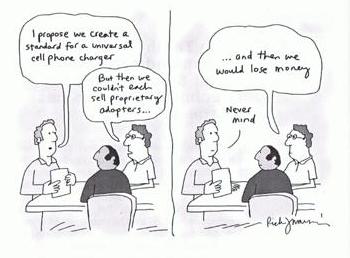Where would we be without open standards? Not a good question for Steve Jobs since Apple is the open standards antichrist and one of the most successful tech companies in the history of Silicon Valley. But one of the reasons why I, along with millions of other enlightened electronic gadget consumers, avoid Apple products with a passion is open standards.

Enlightened people are tired of paying premium prices for closed systems in trendy packaging. Enlightened people will toss their iPods, iPhones, and iPads as soon as Google gets Google Listen right so we can be entertained on Android devices, and as soon as Android apps ramp up. You don’t have to download to Android devices, you can stream directly from the source. Google understands the cloud, it’s not clear Apple does. Google TV could be the knock-out punch in Google vs Apple, open versus closed systems, either way it will be one of the most innovative battles gadget consumers have seen in a long time.
Open standards are also the building blocks of modern semiconductor design. Standard hardware and software interfaces enable cost effective products that integrate easily with embedded processors and other vendor independent SoC enabling technologies. With Open standards, semiconductor and systems design complexity is dramatically reduced for all companies in the design chain. Less time/effort is wasted pursuing incompatible or unproven paths saving consumers both money and frustration.

The best book on standards I have read just came out, “The Ten Commandments for Effective Standards” authored by EDA’s own Karen Bartleson and cartooned by Rick Jamison. I got an autographed copy and a hug from Karen at #47DAC (I blog for hugs). I read it cover to cover during my trip and must say it is an excellent read for technology executives and gadget consumers alike. As Karen says in her intro:
Technical standards play an important role in business as well as everyday life. They provide opportunities for market growth and competition. They enable interoperability. They make customers happier. They bring order out of chaos!

The Ten Commandments for Effective Standards
[LIST=1]
- Cooperate on Standards, Compete on Products
- Use Caution When Mixing Patents and Standards
- Know When to Stop
- Be Truly Open
- Realize There Is No Neutral Party
- Leverage Existing Organizations and Proven Processes
- Think Relevance
- Recognize There Is More Than One Way to Create Standard
- Start with Contributions, Not from Scratch
- Know that Standards Have Technical and Business Aspects

Of course Open standards is a double edged sword. Companies have to innovate on a level technical playing field and not compete on format alone. Companies cannot charge consumers a premium or lock them into outdated product lines so they must innovate fast and efficiently. Open standards is bad news for Apple, Microsoft, Intel, and Cadence executives, but great news for gadget consumers and our overall quality of life. Lets not forget, without open standards we would not have the personal computer, the internet, the world wide web, and most importantly we would not have Android 2.2 FROYO which will change how we do mobile internet from this day forward.lang: en_US








A Century of Miracles: From the FET’s Inception to the Horizons Ahead